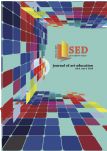EZGİSEL DİKTE ÇALIŞMALARINDA BİLGİSAYAR DESTEKLİ EĞİTİMİN ÖĞRENCİ BAŞARISINA ETKİLERİ
THE EFFECTS OF COMPUTER ASSISTED MELODIC DICTATION INSTRUCTION ON STUDENT ACHIEVEMENT
Author(s): Yusuf ÖZGÜL, Gamze Elif TanınmışSubject(s): Education, Music, School education, Higher Education , Evaluation research, ICT Information and Communications Technologies, Sociology of Art
Published by: Sanat ve Dil Araştırmaları Enstitüsü
Keywords: Music; Melodic Dictation; Computer Assisted Instruction;
Summary/Abstract: In this study, the effect of the computer-assisted dictation training software developed by the researcher on the achievement of university students enrolled in the department of music education was investigated. The study group comprised 30 first-year students attending the Music Theory course at Cumhuriyet University, Faculty of Education, Department of Music Education at 2014-2015 fall semester. The study group was partitioned into experimental (n = 15) and control (n = 15) groups by their scores in the aptitude test conducted the same year. In the study, a “Pretest Posttest with Control Group” full experimental design was used as the quantitative test model. Firstly, the pretest was administered to the experimental group prior to the eight-week implementation period, after which the posttest was administered. The research data revealed a significant difference between the pretest and posttest scores of the control group, who received dictation education in a conventional classroom environment, in favor of the posttest scores. This result showed that conventional dictation education positively affected the dictation achievement of the control group. Similarly, there was a significant difference between the pretest and posttest scores of the experimental group in favor of the posttest scores, indicating that the computer-assisted dictation training positively affected the dictation achievement of the experimental group. Comparison of the posttest scores of the experimental and control groups revealed a significant difference in favor of the experimental group scores. This result showed that the computer-assisted dictation training was more successful than traditional dictation education. In light of the study results, the researcher would like to suggest the provision of in-service training to instructors for the popularization of computer-assisted instruction in universities and high schools. Furthermore, building computer-assisted instruction classrooms would allow willing students to improve their dictation skills during extracurricular time without the need for an instructor.
Journal: SED-Sanat Eğitimi Dergisi
- Issue Year: 4/2016
- Issue No: 2
- Page Range: 143-158
- Page Count: 16
- Language: Turkish

